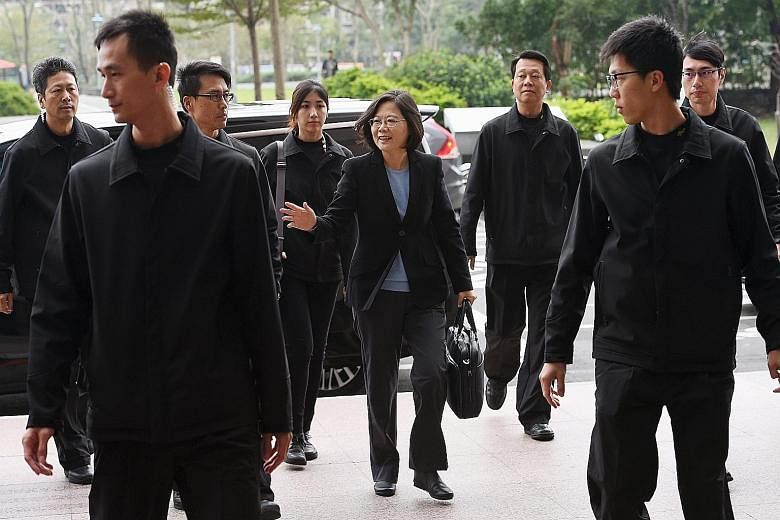Political limbo looms for Taiwan as the outgoing ruling Kuomintang (KMT) party adjusts to a new political landscape, and businessmen dependent on China's goodwill wonder what the future holds.
Premier Mao Chi-kuo and his Cabinet resigned en masse yesterday following the KMT's defeat by the Democratic Progressive Party (DPP) in last Saturday's presidential and parliamentary elections.
Mr Mao, who tendered his resignation the same day, went ahead despite being asked to stay on by President Ma Ying-jeou.
Foreseeing the interim legislative gridlock that would result from the change of power, he said it would prevent his team from effecting major policies at a time when the global economy is slumping.
"This would be detrimental to Taiwan's well-being," he added.
The Premier's departure leaves open the question of who will take over until May 20, when President-elect Tsai Ing-wen is inaugurated.
For now, Vice-Premier Simon Chang will step in to lead the Cabinet and the other ministers will remain in their posts until President Ma decides what to do.
It is a standard constitutional procedure for the Cabinet to submit its resignation following all legislative elections. But previous premiers usually rescind their letters when their president asks them to do so.
What is different this time is that there has been a transfer of power in the legislature. For the first time in Taiwan's history, the KMT has lost control of Parliament.
The new DPP-majority legislature will be sworn in on Feb 1, but with a KMT president still in power until the DPP's Ms Tsai is sworn in.
The result means an awkward four-month transition period.
Under Taiwan's hybrid political structure, the President appoints the Premier and his Cabinet to implement policies, but these need to be approved by the legislature.
"I am leading the Cabinet in resigning, out of respect for the new public sentiment... and to ensure future policies can be implemented smoothly," Mr Mao said yesterday.
In a bid to fill the vacuum, Mr Ma sought out Ms Tsai to appoint an interim Cabinet. She declined, saying this was unconstitutional.
Ms Tsai likely "does not wish to share responsibility with the KMT", said political scientist Edward Chen I-hsin. Any Cabinet she appoints now will still have to be approved by and answer to President Ma until she is officially in power. "So if there are any achievements, the credit will go to Ma," Dr Chen said.
Dr Chen, however, does not expect any major shake-ups in Taiwan in the next four months.
"The daily routine will get done, but there won't be any big policies or changes," he said.
It is not just the government that is in a bind for now.
While much of Taiwan is celebrating the DPP's landslide victory, after what many feel to be eight years of policy wasteland, some in industries with close ties to China are uncertain about the business outlook.
Tour guide Arthur Li and his business partner, for instance, have been thinking of getting a limousine coach complete with karaoke system and plush seats. But now, they are unsure if the NT$250,000 (S$10,700) investment will pay off.
Though Ms Tsai, whose party is pro-independence, has pledged to keep cross-strait relations on an even keel, she does not endorse a one-China doctrine that Beijing views as a fundamental principle.
It remains to be seen how China responds. But in what is seen as the first turning of the screw on Taiwan, the China-led Asian Infrastructure Investment Bank has appeared to close the doors on Taiwan's membership.
Another way China can put the squeeze on Taiwan is to thin the flow of Chinese tourists, numbering more than four million a year. Already, fewer have arrived this month as the government stopped issuing permits due to the elections, said industry players.
Said Mr Li: "We will have to wait and see what happens."

